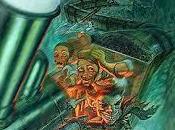Intervista con Gail Carriger
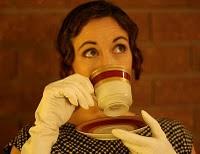 1. Cara Gail, benvenuta nel mio blog. È un piacere per me averti ospite in occasione della pubblicazione in Italia del tuo primo romanzo Soulless. Sono molto emozionata. Vorresti presentarti ai lettori italiani che sono in ansiosa attesa di leggerlo? Io? Sono nata in una piccola cittadina della California da una giardiniera emigrante britannica con la passione per il the e un falegname danese che aveva come hobby scrivere testi filosofici. Passavo le mie estati nel Devonshire, e crebbi con un bruciante bisogno di sondare il passato e rifugiarmi presso altre piccole città intorno al mondo. Per questo ho scelto di fare l’archeologa. Sono tornata poi in California con un carico di lauree, la fissa per il the ereditata da mia madre, la passione per la scrittura ereditata da mio padre, e una terribile tendenza a bighellonare in Paesi stranieri alla disperata ricerca di artefatti antichi e affascinanti – coltivando senza sosta entrambe le passioni durante le mie veglie…
1. Cara Gail, benvenuta nel mio blog. È un piacere per me averti ospite in occasione della pubblicazione in Italia del tuo primo romanzo Soulless. Sono molto emozionata. Vorresti presentarti ai lettori italiani che sono in ansiosa attesa di leggerlo? Io? Sono nata in una piccola cittadina della California da una giardiniera emigrante britannica con la passione per il the e un falegname danese che aveva come hobby scrivere testi filosofici. Passavo le mie estati nel Devonshire, e crebbi con un bruciante bisogno di sondare il passato e rifugiarmi presso altre piccole città intorno al mondo. Per questo ho scelto di fare l’archeologa. Sono tornata poi in California con un carico di lauree, la fissa per il the ereditata da mia madre, la passione per la scrittura ereditata da mio padre, e una terribile tendenza a bighellonare in Paesi stranieri alla disperata ricerca di artefatti antichi e affascinanti – coltivando senza sosta entrambe le passioni durante le mie veglie… 2. Hai pubblicato il tuo primo romanzo Soulless nel 2009 per Orbit Books. Come è stato per te il processo di pubblicazione con questa casa editrice? Ti aspettavi il successo che è arrivato successivamente? Come hai vissuto questa bellissima esperienza? Mi è piaciuto moltissimo lavorare con Orbit. La loro sede americana era ancora nuova quando ho firmato con loro, esisteva da solo 2 anni, credo. Sono stata il loro secondo autore a colpire il New York Times, sono stati veramente fantastici con me. Non ero preparata per il successo. Non mi sono ancora ripresa dallo shock. Pensavo di scrivere solo qualcosa solo che avrei davvero avuto voglia di leggere, una vasta combinazione di generi, romance, urban fantasy, steampunk, alt-history, commedia, parodia, farsa. Se mi guardo indietro agli ultimi due anni, e a tutti i cambiamenti portati dal piccolo libro che ho scritto a seguito di una sfida con un amico, non riesco davvero a crederci.
3. Pubblichi sotto lo pseudonimo di Gail Carriger ma in realtà sotto questo affascinante e misterioso nome si nasconde un'archeologa. Per quale motivo hai deciso di non pubblicare con il tuo vero nome? 1. Mi piaceva l’idea di un alter ego. Mi fa credere di essere una persona più dignitosa di quanto sia io in realtà. 2. Due guardaroba. La prima cosa che ho fatto quando ho deciso di avere uno pseudonimo è stato dividere il mio armadio tra i vestiti che avrei indossato io e quelli che avrebbe indossato Gail. Ora devo fare compere per due! 3. I miei articoli accademici sono pubblicati con il mio vero nome. Non è che mi imbarazzi scrivere romanzi, è solo che voglio sentirmi libera di scrivere anche di erotismo. 4. Non mi piace il mio nome vero; è piuttosto difficile da pronunciare.
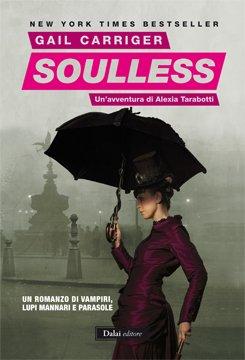 4. Cosa ti ha ispirato a scrivere Soulless? Com’è stata la gestazione del romanzo? Qual’è stata la parte più difficile da scrivere? Volevo scrivere un urban fantasy divertente in un’ambientazione steampunk perché era un libro che avrei voluto leggere, e nessuno non lo aveva ancora scritto. Ho pensato che non avrebbe mai venduto perché era un misto di troppi sotto-generi. Ero veramente scioccata quando ho ricevuto la chiamata. E poi... volevano una serie. La parte più difficile da scrivere, per me, sono le scene erotiche. Non ho difficoltà ad ammetterlo – odio scrivere scene erotiche. Finisco sempre per imbarazzarmi.
4. Cosa ti ha ispirato a scrivere Soulless? Com’è stata la gestazione del romanzo? Qual’è stata la parte più difficile da scrivere? Volevo scrivere un urban fantasy divertente in un’ambientazione steampunk perché era un libro che avrei voluto leggere, e nessuno non lo aveva ancora scritto. Ho pensato che non avrebbe mai venduto perché era un misto di troppi sotto-generi. Ero veramente scioccata quando ho ricevuto la chiamata. E poi... volevano una serie. La parte più difficile da scrivere, per me, sono le scene erotiche. Non ho difficoltà ad ammetterlo – odio scrivere scene erotiche. Finisco sempre per imbarazzarmi. 5. Cosa fai mentre scrivi? Segui un particolare processo creative? Bevi the anche mentre scrivi?Oh, niente di incivile. Con un progetto in corso e in assenza di un lavoro giornaliero (il mio è intermittente) scrivo dalle due alle sette tutti i giorni feriali - con pause per il tè e vizi di cioccolato. Il resto della famiglia, con fatta eccezione per il gatto, è molto rispettoso. Ho instaurato la legge della porta chiusa. Vale a dire: quando la porta del mio ufficio è chiusa, qualsiasi persona provi a disturbarmi rischia di essere colpita dal primo oggetto che mi capita tra le mani. Hanno imparato tutti. Anche il gatto.
6. Soulless e i seguiti sono ambientati durante il regno della regina vittoria a Londra. Quali sono state le ricerche che hai dovuto fare per scrivere questo romanzo? -Quanto ha contato il tuo background per la storia e i personaggi di cui ha raccontato le vicende nei tuoi romanzi? Ero già piuttosto esperta per quanto riguarda alcuni aspetti dell'epoca (moda, cibo, costumi, letteratura, teatro, rituali di corteggiamento nelle classi alte, collezioni di antichità) quando ho iniziato ma grandi lacune in altri settori che ho subito capito dovessero essere colmati. Ho speso un sacco di tempo alla ricerca di accessori e tecnologie attuali, tecniche di comunicazione e di trasporto, medicina e scienze d’avanguardia, medici e la scienza avanza difficile, per non citare altre cose come le guerre principali e le strategie militari, le formazioni dei reggimenti dell'esercito, il lay-out geografico di Londra nel 1870 (negozi e nomi di strade), i giornali, e le politiche governative. Ho anche fatto ricerche sui vampiri e licantropi più famosi del momento. Questo è il punto, non si sa mai quali sono le informazioni che ci servono fino a quando non se ne bisogno, e, inevitabilmente, non si trovano su internet. Dal momento che scrivo di storia alternativa scrittura posso sempre permettermi di ignorare i fatti, ma mi piace conoscerli bene prima, prima di pasticciarli. La maggior parte delle persone non si cura di guardare ai dettagli (o sbagliare confondendo la mia ambientazione con quelle della Austen o quella medio-vittoriana, io sono specializzata nel 1773) ma anche se non mi serve per scrivere il libro, mi innervosisce se qualcosa nello sfondo non scritto è errato. che manca nello sfondo se lo sfondo non scritto informazione è errata. Essere un archeologo certamente mi ha aiutato, so come si effettua una ricerca, e, ancora più importante, quando è il momento di interromperla.
7. Quali sono gli autori passati e attuali che prediligi? Ti andrebbe di consigliarci qualche lettura che hai particolarmente apprezzato? I miei libri preferiti sono the Forgotten Beasts of Eld di Patricia McKillip, The Hitch Hikers Guide to the Galaxy di Douglas Adams, e The Woman Who Rides Like a Man di Tamora Pierce. Del genere urban fantasy adoro tutti i libri di Patricia Briggs, per quanto riguarda lo steampunk mi piace Girl Genius, e per la commedia, devo rimanere fedele al mio primo amore, P.G. Wodehouse. Sono sempre in attesa del prossimo della serie Valor di Tanya Huff. Quanto a quelli che considero simili ai miei, dipende quale aspetto della serie il lettore ama di più. Per l'umorismo direi Jasper Fforde. Per lo steampunk - M.K. Hobson. Per l’alt-history vittoriana Sorcery & Cecelia. Tutti questi, potrei aggiungere, hanno fatto milioni di volte meglio di quanto avessi mai potuto io.
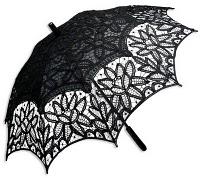 8. Miss Alexia Tarabotti è una protagonista atipica data l'ambientazione storica che hai scelto, sia dal punto di vista caratteriale che fisico. Da dove nasce l'idea di questa straordinaria protagonista? C'è qualcosa di lei che ti rispecchia? Per esempio anche tu hai una smodata passione per parasoli e il the inglese :-) Alexia è una zitella che deve far fronte a un vasto numero di imbarazzanti problemi: è di origini italiane (e si vede), legge troppo, non ha anima, ha accidentalmente ucciso un vampiro, e ora c’è un lupo mannaro enorme ad infastidirla come risultato finale. Tende ad affrontare questi problemi o colpendoli sulla testa con un parasole, o parlandoci insieme, con risultati altrettanto disastrosi. Oh, e la sua migliore amica è solita indossare cappelli molto ridicoli. Mi piace pensare che siano il suo carattere prosaico e il suo umorismo sagace a piacere di più. Sospetto che io e Alexia siamo più simili di quanto riesca ad ammettere. Oh, aspetta, mi rifiuto di rispondere a questa domanda per il fatto che potrei incriminarmi da sola! In realtà, tratti della mia personalità si affacciano in tre dei miei personaggi, uno dei quali non appare fino al secondo libro. Lascio ai miei mio lettori il compito di indovinare quali sono questi tre.
8. Miss Alexia Tarabotti è una protagonista atipica data l'ambientazione storica che hai scelto, sia dal punto di vista caratteriale che fisico. Da dove nasce l'idea di questa straordinaria protagonista? C'è qualcosa di lei che ti rispecchia? Per esempio anche tu hai una smodata passione per parasoli e il the inglese :-) Alexia è una zitella che deve far fronte a un vasto numero di imbarazzanti problemi: è di origini italiane (e si vede), legge troppo, non ha anima, ha accidentalmente ucciso un vampiro, e ora c’è un lupo mannaro enorme ad infastidirla come risultato finale. Tende ad affrontare questi problemi o colpendoli sulla testa con un parasole, o parlandoci insieme, con risultati altrettanto disastrosi. Oh, e la sua migliore amica è solita indossare cappelli molto ridicoli. Mi piace pensare che siano il suo carattere prosaico e il suo umorismo sagace a piacere di più. Sospetto che io e Alexia siamo più simili di quanto riesca ad ammettere. Oh, aspetta, mi rifiuto di rispondere a questa domanda per il fatto che potrei incriminarmi da sola! In realtà, tratti della mia personalità si affacciano in tre dei miei personaggi, uno dei quali non appare fino al secondo libro. Lascio ai miei mio lettori il compito di indovinare quali sono questi tre. 9. Qual è il tuo personaggio preferito e perché? Qual è quello che invece vorresti essere? E qual è invece quello di cui ti sei più divertita a scrivere? Adoro Lord Akeldama perché è così deliziosamente divertente da descrivere – tutto quel corsivo furioso pieno di azione. Ho l'impressione che sia solo necessario leggerlo per capirne il perché. Se potessi essere effettivamente Lord Akeldama potrei essere tentata di vivere nella società vittoriana. Mi sarebbe piaciuto essere svolgere una vita così scandalosa. Credo che Ivy Hisselpenny sia la più divertente da descrivere, è così assurda e così ottusa.
10. Nel tuo romanzo si affronta il tema della quantificazione dell'anima nelle persone ma anche negli esseri soprannaturali. Scienza ed etica si intrecciano. Cosa ne pensi in proposito? Da dove è scaturita l'idea di questa quantificazione dell'anima che per la maggior parte delle persone è solo qualcosa di puramente effimero e non quantificabile? E' un approccio molto vittoriano, a quanto pare. Stavo giocherellando pigramente con l'idea di come una persona sarebbe potuta diventare da non-morta. Dopo tutto, se vampiri e lupi mannari se ne vanno in giro, che cosa è che gli evita di saltarsi addosso gli uni con gli altri? Ci deve essere prima di tutto un controllo biologico della procreazione. Tenendo conto di ciò che sapevo della teoria scientifica, vittoriana, ho ipotizzato che un'anima in eccesso presente solo in alcune persone potesse valere statisticamente per quanto riguarda i sopravvissuti ai morsi. Questo mi ha portato a indagare sulla misurazione dell'anima - che uno scienziato americano in realtà ha cercato di fare alla fine del 1800. Questo, a sua volta, mi ha condotto verso all'idea che se qualcuno aveva troppa anima dovessero essere altri che avevano ne avevano troppo poca, o per niente. E che queste persone potrebbero agire come annullatori per le proprietà soprannaturali. Così è nata Alexia.
11. Nel tuo romanzo coniughi lo steampunk, il romance e il paranormal. Una commistione di generi per niente usuale. Come sei riuscita in questo intento senza che il romanzo risultasse troppo "denso" di elementi? Questi sono anche i generi che generalmente prediligi anche come lettrice? Il fatto è semplice: questo era quello che volevo leggere. Mi piace lo steampunk ma tende ad essere un po’ troppo oscuro e pieno di chiacchiere tecnologiche per me. Mi piace l’urban fantasy, ma non vado pazza per le ambientazioni moderne. Così ho pensato che avrei potuto solo combinare i due, e poi agitare il tutto con un briciolo in più romanticismo e un bel pò'di commedia. Poi ho cominciato a pensare a quale tipo di mondo potesse ospitare tutti questi diversi elementi. Ho familiarità con l'epoca vittoriana e la trovo una ricca fonte di divertimento in sé e per sé. Quelle mode ridicole e l’ossessione per l’etichetta me lo hanno fatto sembrare il periodo ideale di tempo a cadere per inserirci vampiri (che dettavano tali mode) e lupi mannari (che li contrastavano), per non citare la tecnologia del vapore. Mi sembrava che quello che la commedia non poteva fornire per quanto riguardava la trama e i personaggi, una Londra vittoriana alternativa avrebbe sopperito anche solo rimanendo tale e quale. E penso che abbiano funzionato insieme grazie all'umorismo.
12. Come ti sei avvicinata al genere steampunk e cosa ti piace di questo genere? Mia madre è una emigrate tracannatrice di the. Sono cresciuta leggendo libri inglesi per bambini (Tom’s Midnight Garden, The Borrowers, The Water Babies, Wind in the Willows) e ho passato molte delle mie estati in gioventù nel Devon e due anni della scuola di specializzazione nelle Midlands. E 'stato questo, più il concetto estetico riguardo la moda, che per prima mi ha attirata verso lo steampunk - la bellezza degli abiti del diciannovesimo secolo, ma con un tocco meno rigido per tutti i giorni. Io adoro l’epoca vittoriana. Ero solita creare gonne a palloncino con il mio hula-hoop da bambina. Mi piace anche il lato creativo dello steampunk - la tecnologia che è possibile vedere funzionare, piuttosto che gli iPod d'argento con tutte le loro funzionalità nascoste. Il movimento della letteratura gotico vittoriana letteratura ha visto la nascita della fantascienza. Il movimento steampunk attuale è un strano modo per completare il cerchio, che ha radici nella fantascienza – e mi piace molto.
13. L'octopus che è l'immagine sul dorso del libro e che viene anche riportato nei libri più volte sarà in qualche modo spiegato? Ogni libro rivela un pò di più sul polipo e la sua importanza. Un giorno, forse, tutto sarà rivelato. Accenno solamente che ho scelto questa creatura particolare per la sua intelligenza.
14. Il quinto libro sarà anche l'ultimo della serie? Se si cosa hai in mente per il finale per una protagonista particolare come Alexia? Ci puoi svelare qualche succosa anteprima? Al momento, la serie Parasol Protectorate comprende cinque libri: 1. Soulless,2. Changeless, 3. Blameless, 4. Heartless, and 5. Timeless. Sono certa al 90% che la storia di Alexia and Conall terminerà qui. Ho in serbo un meraviglioso, scandaloso, agrodolce, arzigogolato, sciocco finale ed ha tutto a che fare con l'Egitto.
15. La tua serie con protagonista Alexia Tarabotti ha avuto un enorme successo nel mondo. Oltre a nuovi romanzi della serie Parasol Protectorate hai in programma nuovi romanzi di altri generi? Certamente! La serie The Finishing School è indirizzata ai ragazzi ed è ambientata nello stesso mondo della serie The Parasol Protectorate, solo venticinque anni in anticipo. Parla di una accademia di moda situata in un dirigibile simile ad un grosso bruco che fluttua sopra Dartmoor nella quale viene insegnato a giovani donne a…rifinire…tutto…e tutti…in base alle necessità. E comprenderà la steampunk etiquette! E spionaggio ben vestito! E cibo finto vittoriano. Ci saranno bassotti meccanici volanti chiamati Bumbersnoot. Sono eccitata. Il primo libro uscirà nel 2012.
16. Grazie mille ancora una volta. È stato un vero piacere per me. Hai qualcosa da aggiungere prima di salutarci? Il piacere è mio. Vorrei dirvi che sono particolarmente eccitata all’idea che il mio libro venga pubblicato in Italia in quanto è probabilmente luogo che preferisco al mondo. Ho intrapreso i miei primi scavi presso un sito etrusco tra Firenze e Borgo San Lorenzo. Il terzo libro della serie, Blameless, è ambientato prevalentemente in Toscana. E consiglio ai lettori di visitare proprio quei siti etruschi!
Interview with Gail Carriger
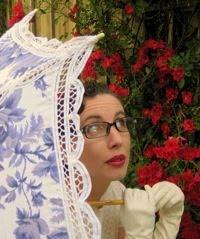 1. Dear Gail, welcome to my blog. It 's a pleasure for me to have you as a guest in the occasion of the publication in Italy of your debut novel Soulless. I'm very exciting. Would you like to introduce yourself to Italian readers who are waiting anxiously to read your novel? Me? I was born in small town California to a British ex–pat gardener with a tea habit and a woodworking Dane who sidelined as a philosophical scribbler. I spent my summers in Devonshire, and matured with a burning need to investigate the past and escape to other small towns all around the world. Hence archaeology. I ended up back in California with too many advanced degrees, a tea habit inherited from my mother, a scribbling habit inherited from my father, and a dreadful penchant for gadding off to foreign countries in hot pursuit of fascinating ancient artifacts – dragging both habits ruthlessly in my wake.
1. Dear Gail, welcome to my blog. It 's a pleasure for me to have you as a guest in the occasion of the publication in Italy of your debut novel Soulless. I'm very exciting. Would you like to introduce yourself to Italian readers who are waiting anxiously to read your novel? Me? I was born in small town California to a British ex–pat gardener with a tea habit and a woodworking Dane who sidelined as a philosophical scribbler. I spent my summers in Devonshire, and matured with a burning need to investigate the past and escape to other small towns all around the world. Hence archaeology. I ended up back in California with too many advanced degrees, a tea habit inherited from my mother, a scribbling habit inherited from my father, and a dreadful penchant for gadding off to foreign countries in hot pursuit of fascinating ancient artifacts – dragging both habits ruthlessly in my wake. 2. You have published your first novel Soulless in 2009 with Orbit Books. How was the publishing process with this house? Were you expecting the success that came later? How do you live this wonderful experience?
I enjoyed my experience with Orbit immensely. Their US branch wasquite young when I signed with them, only 2 years old, I think. I was only their second author to hit the New York Times, they have been really great with me. I was not prepared for the success. I still haven’t recovered from the shock. I thought I was writing something only I would really want to read, it's such a broad combination of genres, romance, urban fantasy, steampunk, alt-history, comedy, parody, farce. I look back on the last two years, and all the changes that have resulted from the one little book I wrote on a dare from a friend, and I can't really believe it.
3. You publish with the pseudonym of Gail Carriger but in reality this fascinating and mysterious name hides an archaeologist. Why did you decide to publish not with your real name?
1. I like the idea of an alter ego. I get to pretended to be a person far more dignified than I.
2. Two wardrobes. The first thing I did when I'd decided on a pseudonym was divide my closet into things I'd wear, and things Gail would wear. Now I get to shop for two!
3. My academic articles are published under my real name. It's not that I'm embarrassed to be writing genre, it's just that I want my nookie options left open.
4. I don't like my real name; it's a hippy dippy mouthful.
4. What inspired you to write Soulless? Which was the gestation of the novel? What was the hardest part of writing this book?
I wanted to write a light–hearted romantic urban fantasy in a steampunk setting because that was the book I wanted to read, and no one else was writing it. I figured it would never sell because it was dabbling in far too many sub–genres. I was genuinely shocked when I got the call. And then … they wanted a series. The hardest part to write, for me, is the nookie scenes. I don’t mind admitting it – I hate to write nookie. I always end up embarrassing myself.
5. What do you do while are you writing? Have you a particular creative process? Do you drink tea also when you are writing?
Oh I’m nothing if not civilized. With a project due and no day job (mine’s intermittent) I write from 2 to 7 every weekday – with breaks for tea and bribes of chocolate. The rest of the household, with the exception of the cat, is quite respectful. I have a closed–door policy. Which is to say: if the door to my office is closed my policy is to throw the nearest moveable object at anyone who disturbs me. They’ve learned. Even the cat.
6. Soulless and following books are set during the reign of Queen Victoria in London. What kind of research have you done to write this novel? How much did your background helped you for the story and characters narrated in your novels?
I had a fair bit of expertise in certain aspects of the era (fashion, food, manners, literature, theatre, upper class courting rituals, antiquities collecting) when I started but great gaps in other areas that I quickly realized needed to be filled. I spent a lot of time researching the gadgetry and technology of the day, travel and communications techniques, medical and hard science advances, not to mention other things like major wars and military strategies, configuration of army regiments, geographical lay out of London in the 1870s (shops and streets names), newspapers, and government policies. I also looked into vampire and werewolf lore at the time. That’s the thing, you never know what information you are going to need until you need it, and inevitably the internet doesn’t have it. Since I’m writing alt history I can always disregard the facts, but I like to get it right first, before I mess with it. Most people won’t care to look up the details (or get it wrong by confusing my setting with Austen or mid–Victorian, I’m specifically 1773) but even if it doesn’t make it into the book, it will irritate me if unwritten background information is flawed. Being an archaeologist certainly helped, I have a lot of training in how to research, and, more importantly, when to stop.
7. Which are the past and present authors you like? Would you recommend some reading that you particularly appreciated?
My favorite books are he Forgotten Beasts of Eld by Patricia McKillip, The Hitch Hikers Guide to the Galaxy by Douglas Adams, and The Woman Who Rides Like a Man by Tamora Pierce. In urban fantasy I adore anything by Patricia Briggs, so far as steampunk is concerned I like Girl Genius, and in the arena of comedy, I have to stay true to my first love, P.G. Wodehouse. I’m always waiting for the next in Tanya Huff’s Valor series. As for those that are like my books, that depends on which aspect of the series the reader likes the best. For the humor I’d say Jasper Fforde. For the steampunk - M.K. Hobson. For alt-Victoriana Sorcery & Cecelia. All of whom, I might add, did it a million times better than I ever could.
8. Miss Alexia Tarabotti is an unusual hero considering the unusual historical setting you chose, both physically and for her character. Where did you take the idea of this extraordinary character? Is there's something in her that is reflecting you? For example, you also have an extraordinary passion for parasols and English tea :-)
Alexia is a spinster coping with a vast number of embarrassing problems: she has Italian heritage (and looks it), she reads too much, she has no soul, she has accidentally killed a vampire, and she now has a large werewolf bothering her as a result. She tends to cope with these problems by either bashing them over the head with a parasol, or talking at them, with equally disastrous results. Oh, and her best friend is prone to wearing very silly hats. I like to think it’s her prosaic character and dry wit that appeals most. I suspcet Alexia and I are more similar than I’d like to admit. Oh, wait, I refuse to answer that question on the grounds that I might incriminate myself! Actually, bits of my personality come out in three of my characters, one of which doesn’t appear until the second book. I’ll leave my readers to guess which three.
9. Which is your favorite character and why? Which one instead would you like to be? And which was the funniest to write about?
I adore Lord Akeldama because he is so deliciously fun to write – all that mad italic–wielding action. I’m under the impression you need only read him to understand why. If I could actually be Lord Akeldama I might be tempted into living in Victorian society. I’d enjoy leading such an outrageous life. I think Ivy Hisselpenny is the funniest to write, she is so absurd and so obtuse.
10. Your novel deals with the quantification of the soul concerning humans but also supernatural beings. Science and ethics intertwines here. What do you think about it? What inspired you the idea of this quantification, which for most of the people is just something purely ephemeral and cannot be quantified? It's a very Victorian approach, as it turns out. I was idly toying with the idea of how a person would become undead. After all, if vampires and werewolves are bouncing about, what’s to keep them from turning everyone? There must be biological procreative controls in place. Taking into account what I knew of Victorian scientific theory, I hypothesized that an excess soul found in only a few people might account for bite–survival rates. This led me to investigate the measuring of the soul – which an American scientist actually tried to do in the late 1800s. This, in turn, lead to the idea that if some people had too much soul there should be others who had too little, or none at all. And these people could act as nullifiers to supernatural abilities. Thus Alexia was born.
11. In your novel you mix steampunk, romance and paranormal genres. A quite singular mixture. How did you achieve it without rendering the novel too "plenty" of elements? Are these the genres that generally you love as a reader? The simple fact is: this was what I wanted to read. I like steampunk but it tends to be a little too dark and riddled with technobabble for me. I enjoy urban fantasy but am not wild about a modern setting. So I thought I might just combine the two, and then shake it up with a jot more romance and a whole lot of comedy. Then I started thinking about what kind of world could accommodate all these different elements. I’m familiar with the Victorian era and I find it a rich source of amusement in and of itself. Those ridiculous fashions and that obsession with etiquette seem the perfect time period to drop in vampires (dictating such things) and werewolves (chaffing against them) not to mention steam technology. It seemed to me that what comedy I couldn’t supply with plot and character, an alternate Victorian London could provide just by being itself. It think they work together because of the humor.
12. How did you come to the steampunk genre and what do you like about this genre?My Mum is a tea–swilling ex–pat. I was raised on British children’s books (Tom’s Midnight Garden, The Borrowers, The Water Babies, Wind in the Willows) and I spent many a youthful summer in Devon and two years of graduate school in the Midlands. It was this, plus the fashion aesthetic, that first drew me to steampunk – the beauty of 19th century clothing but with a less ridged everyday feel. I adore the Victorian era. I used to make hoopskirts out of my hula–hoops as a child. I also love the makers side of steampunk – technology you can see working, rather than little silver iPods with all their functionality secreted away. The Victorian Gothic literature movement saw the birth of science fiction. The current steampunk movement is a weird kind of full circle, taking sci–fi back to its roots ~ I love that.
13. The picture of the octopus on the back of the book, also repeated several times in the books, will be explained in some way? Each book reveals a bit more about the octopus and its significance. Someday, perhaps, all will be revealed. I will drop the hint that I chose this particular creature for its intelligence.
14. Will he fifth book be the last of the series? Do you have in mind a particular ending for such peculiar main character like Alexia? Can you reveal us some juicy preview?Currently, the Parasol Protectorate includes five books: 1. Soulless, 2. Changeless, 3. Blameless, 4. Heartless, and 5. Timeless. I am 90% certain Alexia and Conall’s story will end there. I have a wonderful, outrageous, bittersweet, character riddled, silly ending and it's all to do with Egypt.
15. Your series starring Alexia Tarabotti was a huge success in the world. In addition to the new novels of the Parasol Series Protectorate have you plans for new novels of other genres?I do indeed! The Finishing School Series is young adult and set in the same world as The Parasol Protectorate series, only 25 years earlier. It features a finishing academy located in a giant caterpillar-like dirigible floating over Dartmoor in which young ladies are taught to finish everything and everyone as needed. There will be steampunk etiquette! There will be well-dressed espionage! There will be Victorian fake food. There will be flying mechanicalsausage dogs named Bumbersnoot. I am excited. The first book will come out in 2012.
16. Thank you so much again. It was a real pleasure for me. Do you have something to tell before you say goodbye? My pleasure. I would like to say that I am particularly excited for the books to come out in Italy as it is probably my favorite place in the world. My first excavations were at an Etruscan site between Florence and Borgo San Lorenzo. The third book in the series, Blameless, features Tuscany quite heavily as a setting. And readers might want to look out for that very Etruscan site!





